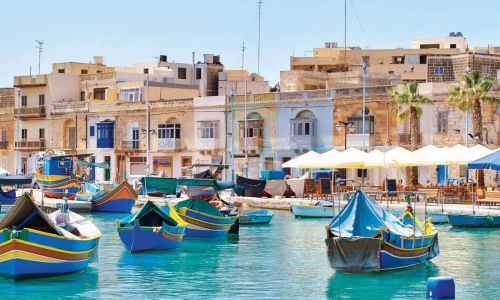In the vibrant Mediterranean island of Malta, opportunities abound for individuals seeking employment, self-employment, or remote work. With its favorable tax legislation and diverse industries, Malta has become an attractive destination for expats and digital nomads alike. As the saying goes, "The world is your oyster," and in Malta, this sentiment rings true. EU citizens enjoy the privilege of working and living in Malta without the need for a work permit, while non-EU workers must navigate the process of obtaining various permits and visas. Industries such as IT, pharmaceuticals, medical, legal, and financial offer promising job prospects, particularly for those with experience in finance. Furthermore, Malta’s Nomad Residence Permit caters specifically to remote workers, granting affordable residency and the freedom to travel within the Schengen area. Whether seeking employment or self-employment, Malta offers a wealth of opportunities and support to those seeking a path to professional and personal freedom.
Key Takeaways
- EU citizens can live and work in Malta without a work permit.
- Non-EU workers need a work permit, visa, residency permit, and work visa to work in Malta.
- The Nomad Residence Permit in Malta is for digital nomads who work remotely and offers affordable residency, free movement within the Schengen area, and eligibility for Maltese citizenship after 5 years.
- Self-employment in Malta requires a Social Security number, a Sole Proprietor application form, and a legitimate business plan, along with other requirements for Third Country Nationals.
Job Opportunities
Job opportunities in Malta are diverse and span across industries such as IT, pharmaceuticals, medical, legal, and financial, with a particular focus on the growing technology industry and the expanding pharmaceuticals industry due to medicinal cannabis approval. The demand for skilled workers in these sectors has led to job growth and career advancement opportunities for both locals and foreigners. The technology industry, especially iGaming, is experiencing significant growth, attracting professionals with expertise in this field. Similarly, the pharmaceuticals industry is expanding due to the approval of medicinal cannabis, creating a demand for professionals in research, production, and distribution. Moreover, Malta has tax-friendly legislation for finance and accounting professionals, making it an attractive destination for individuals seeking job opportunities in these fields. Overall, Malta offers a range of job opportunities in various industries, allowing individuals to pursue their careers and find opportunities for career advancement.
Work Permits and Visas
Visas and work permits are essential requirements for individuals seeking employment opportunities in Malta. Non-EU workers must obtain a work permit to work in Malta, which is employer-specific and valid for one year. In addition to the work permit, non-EU workers also need to obtain a visa and residency permit to legally work and reside in Malta. The visa application process involves providing necessary documents such as a valid passport, a job offer letter, proof of accommodation, and proof of financial stability. It is important to note that the visa application process may vary depending on the individual’s country of citizenship. By fulfilling the work permit requirements and successfully completing the visa application process, individuals can secure the necessary legal documentation to work in Malta and explore employment opportunities in various industries.
Industries in Malta
The diverse sectors in Malta, including IT, pharmaceuticals, medical, legal, and financial, contribute significantly to the country’s economic growth. These industries offer a range of job opportunities for both locals and foreigners. The technology industry, particularly iGaming, is experiencing rapid growth in Malta, attracting professionals in the field. Additionally, the pharmaceuticals industry is expanding due to the recent approval of medicinal cannabis. This has led to an increase in demand for professionals in this sector. Other major companies in Malta include HSBC Malta, Deloitte, Mapfre Middlesea, Epic, Air Malta, and the University of Malta. These companies provide employment opportunities in various fields. The presence of these industries and companies makes Malta an attractive destination for individuals seeking remote work opportunities and those looking to explore expanding industries.
| Industry | Opportunities |
|---|---|
| IT | Tech professionals, software developers |
| Pharmaceuticals | Pharmacists, research scientists |
| Medical | Doctors, nurses, healthcare professionals |
| Legal | Lawyers, legal advisors |
| Financial | Accountants, finance professionals |
Cost of Living
The cost of living in Malta is relatively affordable compared to other countries such as the UK or North America. This makes it an attractive destination for individuals looking to work and live abroad. One factor that contributes to the affordability is the social security tax system in Malta. Self-employed individuals, including those with the Nomad Residence Permit, are required to pay a 15% social security tax along with income tax. Despite this, the overall cost of living, including housing, transportation, and daily expenses, remains reasonable. Additionally, the Nomad Residence Permit offers further benefits to remote workers, such as free movement within the Schengen area and eligibility for Maltese citizenship after 5 years. This combination of affordability and opportunities for remote work make Malta an appealing choice for those seeking a balanced lifestyle and financial stability.
Self-Employment Process
To establish self-employment in Malta, individuals must meet specific requirements, such as acquiring a Social Security number and completing a Sole Proprietor application form. In addition to these initial steps, there are several other important considerations for those seeking self-employment in Malta:
-
Business plan requirements: Self-employed individuals in Malta are required to submit a legitimate business plan that outlines their proposed venture. This plan should include details such as the nature of the business, target market, marketing strategies, and financial projections.
-
Social Security tax: Self-employed individuals in Malta are subject to a 15% social security tax. This tax helps to fund social welfare programs and provides individuals with access to healthcare, pensions, and other benefits.
-
Recruiting requirements: To further support the local economy, self-employed individuals in Malta must also recruit at least three individuals who are citizens of the European Economic Area (EEA), Switzerland, or Malta within 18 months of starting their business.
-
Income tax: In addition to the social security tax, self-employed individuals in Malta are also required to pay income tax on their earnings. The amount of income tax will depend on the individual’s income level and other factors.
-
Compliance with regulations: Self-employed individuals in Malta must ensure that they comply with all relevant regulations and laws governing their specific industry or sector. This may include obtaining any necessary licenses or permits and adhering to health and safety regulations.
Overall, establishing self-employment in Malta requires careful planning, adherence to regulations, and a solid business plan. By meeting these requirements, individuals can take advantage of the opportunities that self-employment in Malta has to offer.
Frequently Asked Questions
What is the process for obtaining a Nomad Residence Permit in Malta?
The process for obtaining a Nomad Residence Permit in Malta involves proving remote work capability and meeting income requirements. The permit offers affordable residency, free movement within the Schengen area, and eligibility for Maltese citizenship after 5 years. Holders are exempt from personal income tax.
Are there any restrictions on the type of work that can be done under a student visa in Malta?
What restrictions are there on the type of work that can be done under a student visa in Malta? Are there job opportunities available for students?
How long does it typically take for Jobsplus to process an employment license for foreigners?
The average processing time for employment licenses by Jobsplus in Malta for foreigners is not specified. However, foreigners may face challenges in obtaining employment licenses, such as meeting specific requirements and competition for available positions.
Can foreign workers in Malta apply for Maltese citizenship through the Citizenship By Investment Program?
Foreign workers in Malta have the opportunity to apply for Maltese citizenship through the Citizenship By Investment Program, which requires a significant investment in Maltese Capital Expenditures and the recruitment of local nationals. This provides self-employment opportunities and potential freedom.
What are some common entry-level job opportunities in Malta?
Common entry-level job opportunities in Malta include positions in marketing, human resources, and customer support. These roles provide job training and potential for career advancement, offering opportunities for individuals to gain experience and grow professionally.










